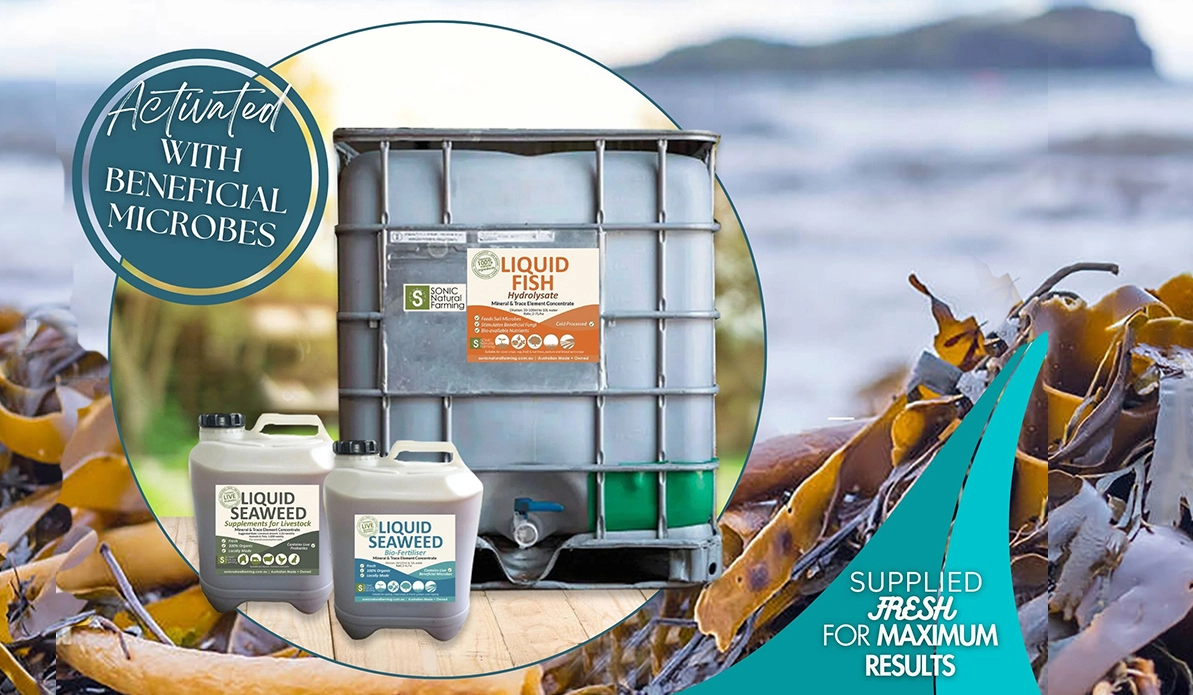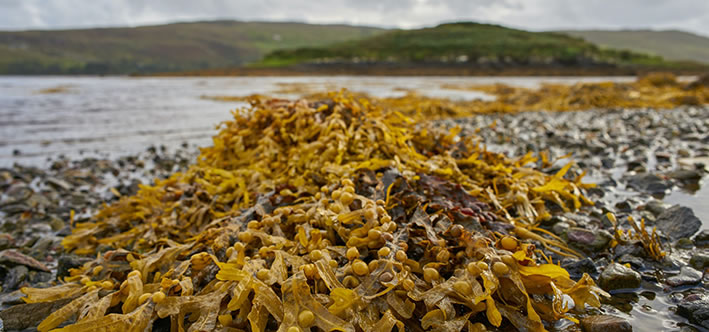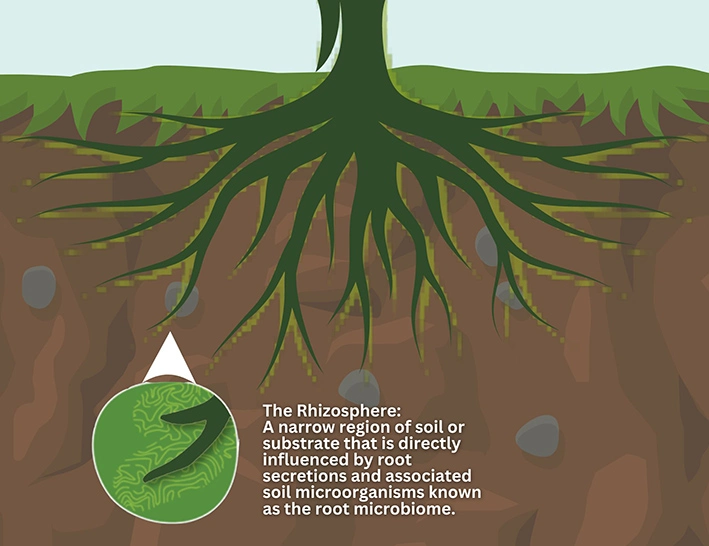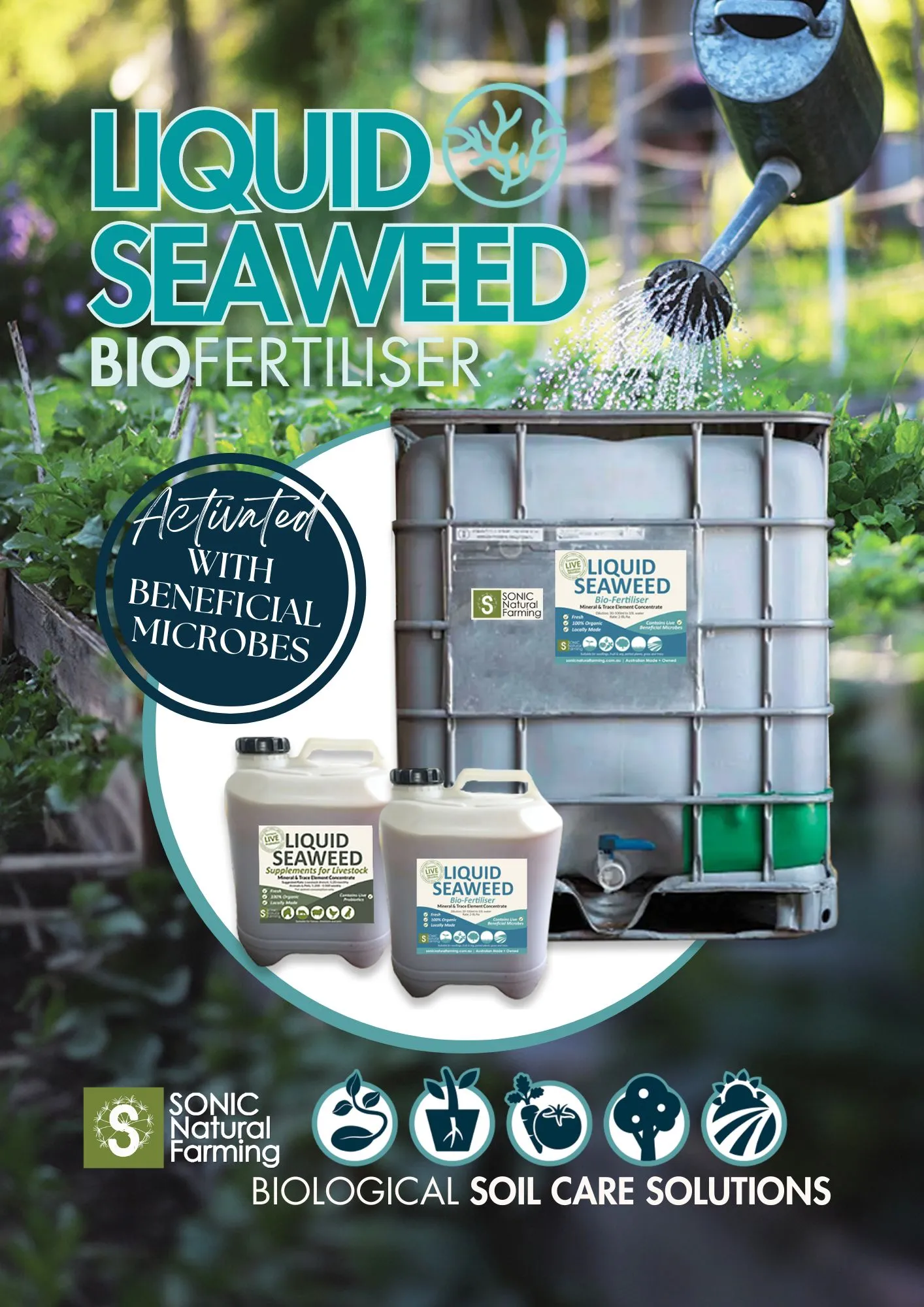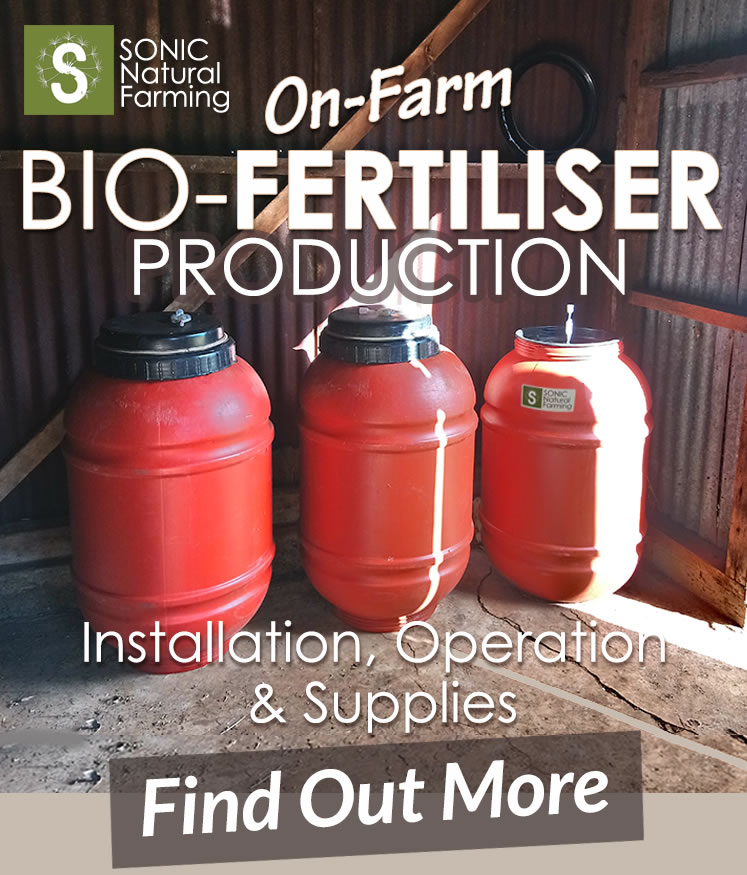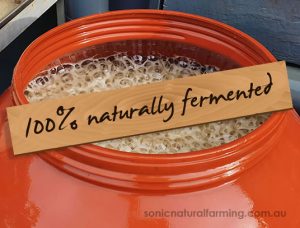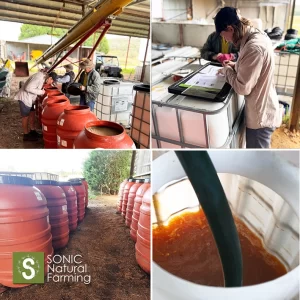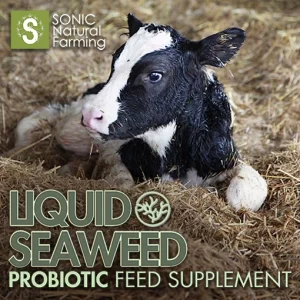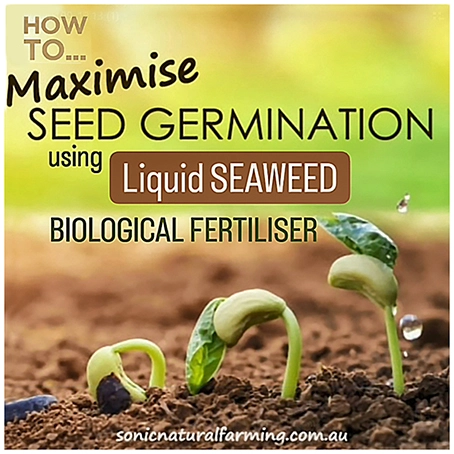In the pursuit of sustainable agriculture, farmers are increasingly looking to nature-based solutions to improve soil health and fertility while minimising their reliance on synthetic inputs. One such remarkable resource is seaweed, which serves as an excellent soil amendment, offering a range of benefits for plant growth and overall agricultural productivity.
Here we uncover our top 7 benefits of seaweed fertiliser used in agriculture, and ways that it can contribute to soil health, regeneration of the land, and growing nutrient dense food.
1. Seaweed has a Natural Chelating Ability
Seaweed contains organic compounds called chelators, which benefits the nutrient absorption process. Chelation refers to the process of binding essential nutrients and minerals in a form that is easily absorbed by plants.
One of the key benefits of seaweed, used in growing, is its ability to enhance nutrient uptake in plants. The chelating agents present in seaweed help to break down complex nutrients into simpler forms, making them readily available for plants to absorb. This results in improved plant growth, increased resistance to stressors, and enhanced overall crop health.
Furthermore, because seaweed is a natural chelate, it offers a highly cost effective option for growers and farmers, due to the fact that a little bit, used regularly, can go a long way.

2. Seaweed Promotes Early Plant Growth & Stronger Roots
Another key benefit of seaweed fertiliser is its high concentration of growth-promoting hormones such as auxins, cytokinins, and gibberellins. These hormones play a crucial role in stimulating cell division, elongation, and differentiation in plants, leading to faster and healthier growth.
Seaweed stimulates the soil’s beneficial microbial activity, particularly in the soil around feeder roots. The mycorrhizae are in the area of the soil known as the ‘rhizosphere’. The microbial activity, stimulated by the addition of seaweed fertiliser, improves the plants ability to form healthier, stronger roots.
3. Seaweed Promotes Photosynthesis
Photosynthesis is the process by which plants convert sunlight, water, and carbon dioxide into energy-rich sugars, releasing oxygen as a byproduct. It plays a crucial role in plant growth and development.
Seaweed Biofertiliser contains various beneficial compounds such as cytokinins, auxins, gibberellins, and betaines that can positively impact photosynthesis. These compounds benefit the efficiency of chlorophyll production and enhancing the overall functioning of chloroplasts within plant cells.
Applying seaweed fertiliser to plants helps stimulate the growth of chlorophyll pigments responsible for capturing light energy during photosynthesis
The stimulation of chlorophyll pigments results in increased absorption of sunlight and more efficient conversion of carbon dioxide into carbohydrates.
Furthermore, Liquid Seaweed Biofertiliser also contains trace elements like magnesium, iron, zinc, and manganese that are essential for proper chlorophyll synthesis. These elements act as cofactors for enzymes involved in various metabolic reactions during photosynthesis.
4. Seaweed Enhances Plant Tolerance to Climatic Stresses
One of the other great benefits of using seaweed fertiliser is it improves resistance to frost and disease because it contains a hormone called Auxins. Auxins attribute to stem strength. Auxins occur in the roots and stems during cell division. They move to areas of cell elongation where they allow the walls of cells to stretch.
Furthermore, the use of liquid seaweed fertiliser has shown to benefit in enhancing plant tolerance to climatic stresses such as drought, salinity, and extreme temperatures. Seaweeds contain osmoprotectants, called betain osmoregulators, that help plants retain water during dry periods or excessive salt exposure. Moreover, seaweed contains antioxidants that scavenge harmful free radicals produced under stressful conditions.
Read article ‘Heat Stress in Plants: Prevention and Recovery’
5. Seaweed gives Fruits and Vegetables a Longer Shelf Life
The action of the auxins in seaweed is known as delaying senescense: the deterioration of cells and tissues that result in rotting. This means that using seaweed fertiliser in a regular soil remediation program, helps to produce food that has a longer shelf life and keeps it’s natural freshness.
Seaweed benefits the overall quality of crops by improving their taste, color, texture, and nutritional content
Seaweed is known for its ability to enrich the nutritional content of food due to its rich sources of essential minerals such as potassium, magnesium, calcium, iron, and iodine. When used as a liquid fertiliser for plants, these nutrients are absorbed by the crops and subsequently passed on to consumers when they consume these foods, which can contribute to a more nutrient-rich diet for individuals.

Kilburney Avocado Farm started using SONIC Seaweed Biological Fertiliser and Fish Hydrolysate on the avocados in 2018. (Above image).
6. Seaweed Contains 70 Minerals, Microelements, Vitamins and Enzymes
Seaweed is rich in essential nutrients such as nitrogen, phosphorus, potassium, and trace elements like iodine, iron, zinc, and magnesium. These nutrients benefit healthy plant development, promoting robust root growth, improved flowering and fruiting, and overall plant vigor.
Scientific research states seaweed microelements are considerably higher than in terrestrial plants
Plants use tiny amounts of the micronutrients, often measured in parts per million. The benefits of these micronutrients are many. Regular applications of Liquid Seaweed Fertiliser and foliar spraying can be an effective way to deliver these micronutrients to the plant, offering a low cost, high value input for farmers.
7. Seaweed Helps Balance Soil Moisture Levels
Seaweed contains beneficial compounds like alginates and carrageenans that act as natural biostimulants. These compounds enhance the plant’s ability to absorb water and nutrients from the soil while improving its resistance to environmental stresses such as drought or disease.
Alginin (sponge like starches) is found in seaweed, and is able to hold droplets of water near the plant roots allowing the roots to take up moisture, when needed, without getting over watered.
Not All Seaweed Fertiliser Products Are The Same
Seaweed alone, ticks a lot of boxes when it comes to soil health benefits. However, capturing the minerals and unique compounds from seaweed, through a cold fermentation process, is where soil, plants and animals can benefit the most. Read about SONIC Biological Liquid Seaweed (Kelp).
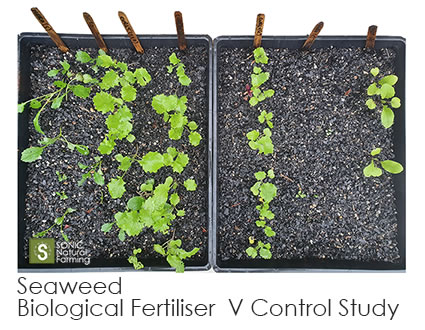
Seed Germination Using Seaweed Biological Fertiliser
Seaweed has high levels of natural plant growth hormones, such as auxins, cytokinins and gibberellins that benefit plant growth.
Read article ‘How to Maximise Seed Germination using Biologically Activated Fertiliser’
In conclusion, incorporating seaweed into agricultural practices offers a sustainable solution for promoting early plant growth. Its nutrient-rich composition coupled with natural growth-promoting hormones make it an invaluable resource for farmers seeking efficient and cost effective ways to benefit crop productivity while minimising environmental impact.
The power of seaweeds as plant biostimulants to boost crop production under abiotic stress – Wiley, Online Library
SONIC Seaweed Biological Fertiliser, made through a cold processing (fermentation) method, enables all the minerals and trace elements to remain in whole and complete state, making them easy to uptake by soil, soil microbes, plants and animals.
The application of seaweed biological fertiliser can be done through seed inoculation, foliar spray, or applied as a soil drench. Farmers and gardeners have observed significant improvements in seed germination rates, early establishment of seedlings, increased crop yields, improved fruit quality, and enhanced resistance to pests, when using natural seaweed soil amendments.
SEAWEED FERTILISER FACT
Many seaweed fertiliser products today are manufactured using an extraction process. The extraction process generally uses an alkali extraction agent, such as potassium hydroxide. This process inevitably denatures a lot of the original compounds found in seaweed, which are known to have many beneficial uses for plants.
For example, seaweed has a compound called betaine osmoregulators. When applied to plants, in its original form, these osmoregulators make plants a lot more resilient to drought stress. It allows the plant cells to regulate water much better, and require less water, which enhances the plants’ tolerance to stress. Betaine osmoregulators are lost using an alkali extraction method.
Cold processing, or natural fermentation, retains all the original compounds of seaweed, in a bio-available state. Read about Biological Fermentation Here.
